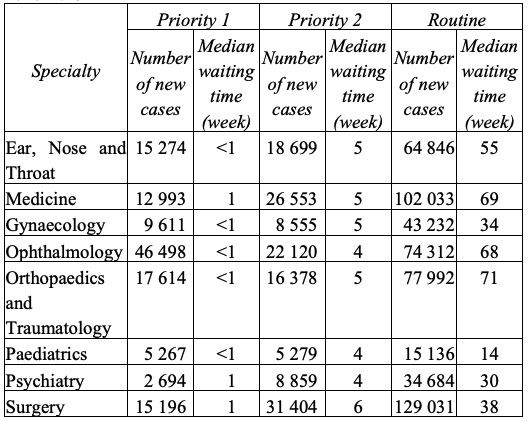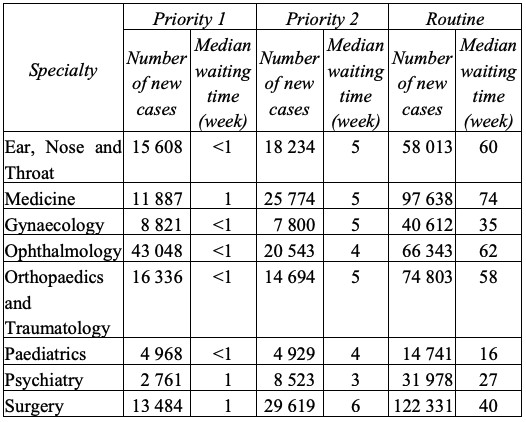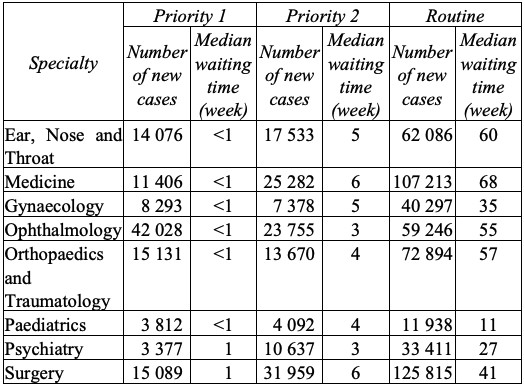MR CHAN KIN-POR (in Chinese): President, regarding the specialist outpatient (“SOP”) services of the Hospital Authority (“HA”), will the Government inform this Council:
(1) whether it knows the respective numbers of new cases of various SOP services in each of the past three financial years;
(2) given that new referral cases will be first screened by nurses and then reviewed by doctors of the relevant specialties for the purpose of classifying them into urgent, semi-urgent and stable cases, whether the Government knows the respective median waiting time of each classification of new cases of various SOP services, in each of the past three financial years;
(3) whether it knows HA’s new measures to shorten the waiting time of new cases of SOP services; and
(4) whether it knows if HA has assessed the extent to which SOP services has been affected by the epidemic, and HA’s new measures to mitigate the impacts?
SECRETARY FOR FOOD AND HEALTH (in Chinese): President, in consultation with the Hospital Authority (“HA”), my reply to the various parts of the question raised by Mr CHAN Kin-por is as follows:
(1) and (2)
The tables below set out the number of specialist outpatient (“SOP”) new cases triaged as Priority 1 (urgent), Priority 2 (semi-urgent) and Routine (stable) cases, as well as their respective median (50th percentile) waiting time in HA in 2018-2019, 2019-2020 and 2020-2021.
2018-2019
2019-2020
2020-2021
Note:
Due to the emergence of the COVID-19 epidemic in Hong Kong since early 2020, HA has stepped up infection control measures and adjusted its services according to the epidemic situation. Hence, its service throughput across a wide range of services might have been reduced when compared with that of previous years.
(3) In managing the waiting time for SOP services, HA has implemented a series of measures including triage and service prioritization, enhancing public primary care services, strengthening manpower, optimizing the scheduling of appointments, as well as displaying information of the latest waiting time on HA’s website and at the SOP Clinics (“SOPCs”) to help patients to consider their treatment plans and options. Moreover, additional public-private partnership programmes have been implemented and the Integrated Model of SOP Services was introduced. HA will review the effectiveness of these measures in a timely manner and implement supplementary measures as appropriate and necessary to further shorten the SOPC waiting time. In 2021-2022, HA will continue to implement the Annual Plan to enhance the service capacity of SOPCs in various hospital clusters, covering the majority of major specialties.
(4) During different stages of the epidemic, HA made timely adjustments to non-emergency and non-essential medical services, including certain SOP services, so as to focus manpower on providing care for the most critical patients and responding to the epidemic situation. Since mid-February 2021, certain non-emergency services have progressively been resumed in public hospitals under safe and practicable circumstances. In mid-March, HA’s outpatient services largely returned to the level of the same period in 2019 (i.e. before the epidemic).
HA adopts different modes of service where practicable, including piloting the use of telehealth consultations, to provide the SOP services for suitable patients. In addition, during service resumption, consideration was given to increasing the manpower and service sessions of SOPCs through the Special Honorarium Scheme having regard to the operation of SOPCs in order to render optimal services to patients.
In light of the development of the epidemic situation as well as the actual environment and operational needs of hospitals, HA will continue to closely monitor the utilization of anti-epidemic equipment and facilities, and flexibly adjust hospital services and deploy manpower with a view to minimizing the impact on patients.


